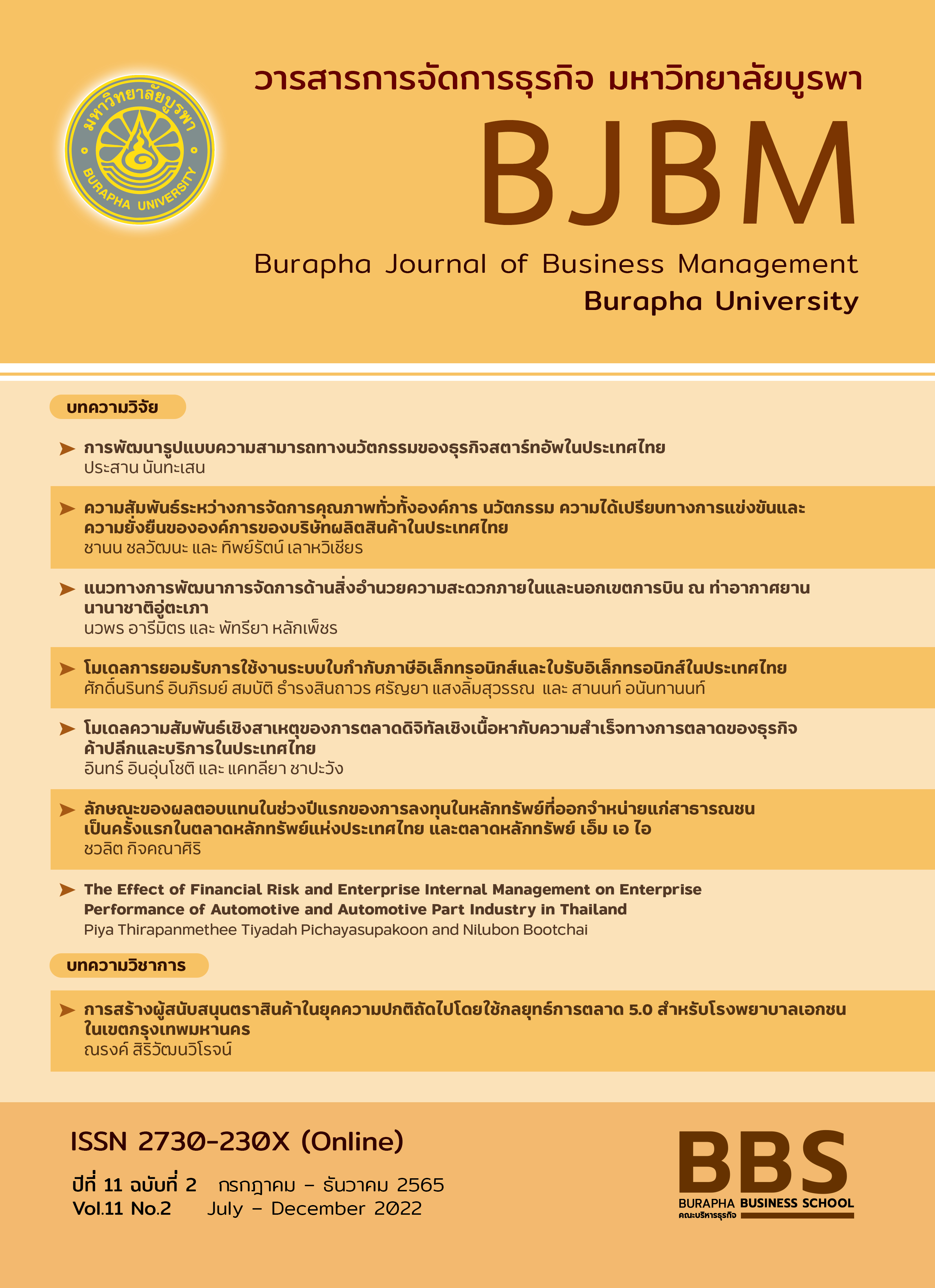การพัฒนารูปแบบความสามารถทางนวัตกรรม ของธุรกิจสตาร์ทอัพในประเทศไทย
Main Article Content
บทคัดย่อ
การวิจัยนี้มีวัตถุประสงค์เพื่อ (1) ศึกษาอิทธิพลของปัจจัยเหตุที่มีผลต่อความสามารถทางนวัตกรรมของธุรกิจสตาร์ทอัพ (2) เพื่อศึกษาอิทธิพลของความสามารถทางนวัตกรรมที่มีผลต่อผลการดำเนินงานของธุรกิจสตาร์ทอัพ และ (3) เพื่อพัฒนารูปแบบความสามารถทางนวัตกรรมของธุรกิจสตาร์ทอัพ การศึกษานี้เป็นการวิจัยบูรณาการประกอบด้วย การวิจัยเชิงปริมาณ และการวิจัยเชิงคุณภาพ การวิจัยเชิงปริมาณเก็บรวบรวมข้อมูลจากกลุ่มตัวอย่างธุรกิจสตาร์ทอัพจำนวนทั้งสิ้น 360 บริษัท โดยใช้แบบสอบถาม ส่วนการวิจัยเชิงคุณภาพจะเก็บรวบรวมจากธุรกิจสตาร์ทอัพจำนวน 6 บริษัท โดยการสัมภาษณ์เชิงลึกจากผู้ประกอบการ สถิติที่ใช้ในการวิเคราะห์ข้อมูลประกอบด้วย สถิติเชิงพรรณนา การวิเคราะห์ตัวแบบสมการโครงสร้าง และการวิเคราะห์เนื้อหา ผลการวิจัยพบว่า (1) การวิจัยและพัฒนา นโยบายและการสนับสนุนจากรัฐบาล และความเป็นผู้ประกอบการมีอิทธิพลทางตรงต่อความสามารถทางนวัตกรรม โดยพบว่าปัจจัยที่มีอิทธิพลในระดับมากที่สุดคือ การวิจัยและพัฒนา (2) ความสามารถทางนวัตกรรมมีอิทธิพลทางตรงต่อผลการดำเนินงานของธุรกิจสตาร์ทอัพ และ (3) รูปแบบความสามารถทางนวัตกรรมของธุรกิจสตาร์ทอัพในประเทศไทยที่พัฒนาขึ้นมีความสอดคล้องกลมกลืนกับข้อมูลเชิงประจักษ์ (Chi square/df = 1.25, P-value = 0.13345, RMSEA = 0.02, GFI = 0.99, AGFI = 0.97)
Article Details

อนุญาตภายใต้เงื่อนไข Creative Commons Attribution-NonCommercial-NoDerivatives 4.0 International License.
บทความที่จะตีพิมพ์เพื่อเผยแพร่ในวารสารการจัดการธุรกิจ มหาวิทยาลัยบูรพา จะต้องเป็นบทความที่ไม่เคยได้รับการตีพิมพ์เผยแพร่หรืออยู่ระหว่างการพิจารณาเพื่อตีพิมพ์เผยแพร่ในวารสารอื่น ๆ ทั้งนี้ หากพบว่ามีการละเมิดลิขสิทธิ์ ด้วยข้อคิดเห็นที่ปรากฏและแสดงในเนื้อหาบทความต่าง ๆ ให้ถือว่าเป็นความเห็นและความรับผิดชอบโดยตรงของผู้เขียนบทความนั้น ๆ มิใช่ความเห็นและความรับผิดชอบใด ๆ ของคณะบริหารธุรกิจ มหาวิทยาลัยบูรพา สำหรับในกรณีผู้ประสงค์จะนำข้อความในวารสารการจัดการธุรกิจ มหาวิทยาลัยบูรพา ไปเผยแพร่ต้องได้รับอนุญาตจากกองบรรณาธิการวารสารการจัดการธุรกิจ มหาวิทยาลัยบูรพา ตามกฎหมายว่าด้วยลิขสิทธิ์
เอกสารอ้างอิง
กัลยา วานิชย์บัญชา, และฐิตา วานิชย์บัญชา. (2558). การใช้ SPSS for Windows ในการวิเคราะห์ข้อมูล. (พิมพ์ครั้งที่ 25). กรุงเทพฯ: โรงพิมพ์สามลดา.
ฟอร์บสไทยแลนด์. (2561). กระทรวงวิทย์ฯ ดันสร้างนักรบเศรษฐกิจใหม่ในงาน Startup Thailand 2018. สืบค้นเมื่อ 27 ตุลาคม 2564, สืบค้นจาก http://forbesthailand.com/pr-detail.php?did=2434.
ภาคภูมิ ฤกขะเมธ. (2561). ระบบนิเวศที่เหมาะสมสำหรับการเกิดและดำรงอยู่ของ Startup: การผสมผสาน ทฤษฎีนิเวศวิทยาประชากร และการอุปมาอุปไมยด้วยระบบนิเวศทางธุรกิจ, วารสารการจัดการภาครัฐและภาคเอกชน, 25(2), 41-63.
อนุวัต สงสม. (2560). ความสามารถทางนวัตกรรม: การทบทวนวรรณกรรม และแบบจำลองเชิงแนวคิดเพื่อศึกษาปัจจัยเชิงสาเหตุและผลลัพธ์. วารสารวิชาการมหาวิทยาลัยหอการค้าไทย, 37(4), 182-194.
Anwar, S., & Zheng, M. (2004). Government spending on research and development and industrial production in Singapore. International Journal of Asian Management, 3(1), 53–65.
Australian Government Austrade. (2018). E-commerce in Thailand: A guide for Australian Business. Sydney: Australian Government Austrade.
Bogers, M. (2012). The open innovation paradox: knowledge sharing and protection in R&D collaborations. European Journal of Innovation Management, 14(1), 93-117.
Calik, E., Calisir, F., & Cetinguc, B. (2017). A scale development for innovation capability measurement. Journal of Advanced Management Science, 5(2), 69-76.
Cooney, T. (2012). Entrepreneurship skills for growth-orientated business. Copenhagen: Danish Business Authority.
Davari, A., & Farokhmanesh, T. (2017). Impact of entrepreneurship policies on opportunity to startup. Management Science Letters, 7(9). 431–438.
Gerschewski, S., & Xiao, S. (2015). Beyond financial indicators: An assessment of the measurement of performance for international new ventures. International Business Review, 24(4), 615-629.
Guo, B., Wang, j., & Wei, S. (2018). R&D spending, strategic position and firm Performance. Frontiers of Business Research in China, 12(14), 1-19.
Heij, C. V., Volberda, H. W., Van Den Bosch, F. A. J., & Hollen, R. M. A. (2019). How to leverage the impact of R&D on product innovation? The moderating effect of management innovation. R&D Management, 50(2), 1-18.
Keogh, D., & Johnson, D. (2021). Survival of the funded: Econometric analysis of startup longevity and success. Journal of Entrepreneurship, Management and Innovation, 17(4), 29-49.
Khorshid, R. (2019). Innovation in startups: Drivers and inhibitors. Master´s Thesis, Degree Programmer in International Business Development, Lahti University of Applied Sciences.
Matyas, B., Lowy, D., & Salgado, J. (2019). A measure of enterprises innovative Activity for microfirms and startups. Academy of Strategic Management Journal, 18(6), 1-12.
Mayer, K., Read, S., Brinckmann, J., & Grichnik, D. (2013). Entrepreneurial talent and venture performance: A meta-analytic investigation of SMEs. Research Policy, 42(6), 1251 - 1273.
Nanda, R., & Rhodes-Kropf, M. (2013). Investment cycles and startup innovation. Journal of Financial Economics, 110(2), 403-418.
National Innovation Agency. (2018). Thailand startup ecosystem report 2021. Retrieved October 27, 2021 from https://www.nia.or.th/frontend/article/skhonvse/editor/files/ THAILAND-STARTUP-ECOSYSTEM-REPORT-2021.pdf.
Obaji, N., & Olugu, M. (2014). The role of government policy in entrepreneurship development. Journal of Business and Management, 2(4), 109-115.
Ofir, Z., Schwandt, T., Duggan, C., & McLean, R. (2016). A holistic approach to evaluating research. Ottawa: IDRC
Okrah, J., & Agbozo, E. (2018). Exploring the factors of startup success and growth. The Business and Management Review, 9(3), 229-236.
Okrah, J., & Nepp, A. (2018). Factors affecting startup innovation and growth. Journal of Advanced Management Science, 6(1), 34-38.
Oyelakin, O., & Kandi, U.M. (2017). The moderating role of government policieson the relationship between technology, innovation and entrepreneurship development in Nigeria: A partial least square approach. Universal Journal of Management, 5(10), 477-484.
Paula, F., & Silva, J. (2017). Innovation performance of Italian manufacturing firms: The effect of internal and external knowledge sources. European Journal of Innovation Management, 20(3), 428-445.
Peljko, Z., Jeraj, M., Savoiu, G., & Maric, M. (2016). An empirical study of the relationship between entrepreneurial curiosity and innovativeness. Organizacija, 49(3), 172-182.
Potjanajaruwit, P., & Girdwichai, L. (2019). Creative innovation of startup business in Thailand 4.0 Era. Journal of International Studies, 12(3), 222-231.
Siddiquee, Q., Jain, K., & Rajan, S. (2015). An approach to measure innovativeness of a firm. The International Journal of Management, 4(1), 25-37.
Sopjani, X. (2019). Challenges and opportunities for startup innovation and entrepreneurship as tools towards a knowledge-based economy: The case of Kosovo. Thesis, Rochester Institute of Technology RIT Scholar Works.
Startup Thailand Center. (2021). Startup Thailand ecosystem. Retrieved October 27, 2021 from https://ecosystem.startupthailand.org.
Stoica, O., Raman, A., & Rusu, V. (2020). The nexus between entrepreneurship and economic growth: A comparative analysis on groups of countries. Sustainability, 12(1186), 1-19.
Streimikiene, D. (2014). The Impact of Research and Development for Business Innovations in Lithuania. Amfiteatru Economic, 16(37), 965-979.
Villarreal, J. P. G. (2010). Successful practices and policies to promote regulatory reform and entrepreneurship at the sub-national level. British Columbia: OECD.
Wang, C., & Hsu, L. (2014). Collaborative networks and product innovation performance: Toward a contingency perspective. Research Policy, 38(5). 765-778.
World Bank. (2013). Western Balkans Regional R&D Strategy for Innovation. Washington: World Bank.


